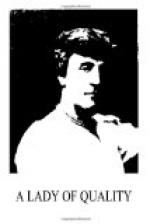For Anne lay upon her pillow so smiling that ’twas a strange thing to behold. It seemed as she were smiling at the whiteness of the doves against the blue. A moment her sister stood up watching her, and then she stirred, meaning to go to call one of the servants waiting outside; but though she moved not her gaze from the tower window, Mistress Anne faintly spoke.
“Nay—stay,” she breathed. “I go—softly—stay.”
Clorinda fell upon her knees again and bent her lips close to her ear. This was death, and yet she feared it not—this was the passing of a soul, and while it went it seemed so fair and loving a thing that she could ask it her last question—her greatest—knowing it was so near to God that its answer must be rest.
“Anne, Anne,” she whispered, “must he know—my Gerald? Must I—must I tell him all? If so I must, I will—upon my knees.”
The doves came flying downward from the blue, and lighted on the window stone and cooed—Anne’s answer was as low as her soft breath and her still eyes were filled with joy at that she saw but which another could not.
“Nay,” she breathed. “Tell him not. What need? Wait, and let God tell him—who understands.”
Then did her soft breath stop, and she lay still, her eyes yet open and smiling at the blossoms, and the doves who sate upon the window-ledge and lowly cooed and cooed.
* * * * *
’Twas her duchess sister who clad her for her last sleeping, and made her chamber fair—the hand of no other touched her; and while ’twas done the tower chamber was full of the golden sunshine, and the doves ceased not to flutter about the window, and coo as if they spoke lovingly to each other of what lay within the room.
Then the children came to look, their arms full of blossoms and flowering sprays. They had been told only fair things of death, and knowing but these fair things, thought of it but as the opening of a golden door. They entered softly, as entering the chamber of a queen, and moving tenderly, with low and gentle speech, spread all their flowers about the bed—laying them round her head, on her breast, and in her hands, and strewing them thick everywhere.
“She lies in a bower and smiles at us,” one said. “She hath grown beautiful like you, mother, and her face seems like a white star in the morning.”
“She loves us as she ever did,” the fair child Daphne said; “she will never cease to love us, and will be our angel. Now have we an angel of our own.”
When the duke returned, who had been absent since the day before, the duchess led him to the tower chamber, and they stood together hand in hand and gazed at her peace.
“Gerald,” the duchess said, in her tender voice, “she smiles, does not she?”
“Yes,” was Osmonde’s answer—“yes, love, as if at God, who has smiled at herself—faithful, tender woman heart!”
The hand which he held in his clasp clung closer. The other crept to his shoulder and lay there tremblingly.




